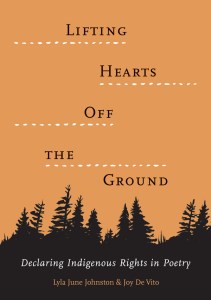
The United Nations Declaration on the Rights of Indigenous People is a fairly short document, only consisting of 46 articles. However, some might find it difficult to read: “[it] sounds like Western legalese and it’s somewhat technical,” says Steve Heinrichs, Director of Indigenous Relations for Mennonite Church Canada. “The words don’t leap off the page; they don’t grab one’s heart and spirit. And that’s what I long for ‒ to find ways to hear and speak and imagine these words so that they come alive.”
Heinrichs is the editor of Lifting Hearts off the Ground, a new book that hopes to bring the Declaration into a new light. Two poets ‒ Lyla June Johnston, who is of Diné (Navajo) and Tsétsêhéstâhese (Cheyenne) descent, and Joy De Vito, a Settler from the Haldimand Tract, Ontario ‒ come together to contemplate and wrestle with the articles in a poetic conversation.
The following is an excerpt from the new book. Lyla Johnston’s poem, in response to Article 43 from an Indigenous perspective, appears first, followed by Joy De Vito’s as she speaks from the role of the Settler. Lifting Hearts off the Ground will be published June 21, 2017 by Mennonite Church Canada.
Article 43: The rights recognized herein constitute the minimum standards for the survival, dignity, and well-being of the Indigenous peoples of the world.
Please do not call this land America.
If you listen you will hear
her true name as the nighthawks
dive at twilight.
As the wolves howl at moonlight.
As the waterfalls rage, cascading.
As the avalanches fracture, breaking.
She will tell you her true name
with earthquakes that split states and break
fences to remind you she does not belong to you.
We cannot write your rights on a paper
and you cannot write ours either.
They are written into the bark of trees.
They are written
in the silence between you and me.
Still we try like fumbling humans
and, no matter its shortcomings,
there is the honour we seek.
The honour we need to breathe.
‒ Lyla June Johnston
It is disquieting:
the basic requirements for dignity,
the minimum standards for respect,
need to be written down.
What does a written word make true?
Words become flesh when they are lived.
‒ Joy De Vito
Lyla June Johnston was raised in Taos, New Mexico, and is a descendent of Diné (Navajo), Tsétsêhéstâhese (Cheyenne), and European lineages. She holds a degree in Environmental Anthropology with honours from Stanford University.
Joy De Vito is a Settler Canadian living in the Haldimand Tract, Ontario, the traditional lands of the Neutral, Anishinaabe, and Haudenosaunee Nations. Currently a student in theology at Conrad Grebel University College, Joy is exploring ways in which institutions can engage decolonization through relationship.
Feature image: “Mural” from the St. Norbert Farmer’s Market, by Kyla Roma, cropped






